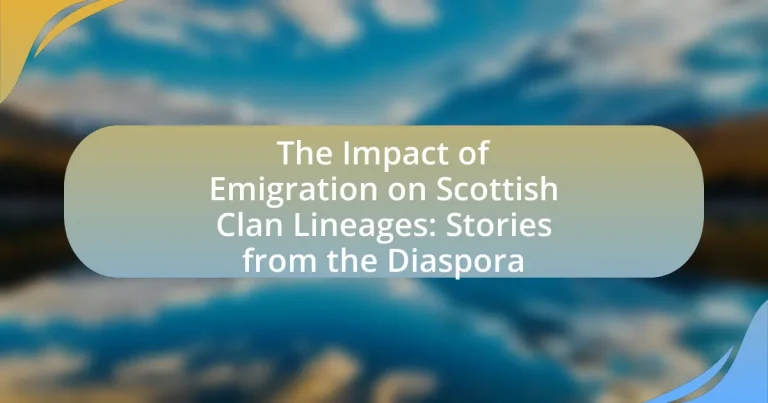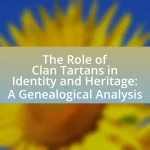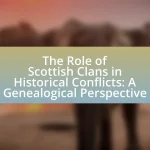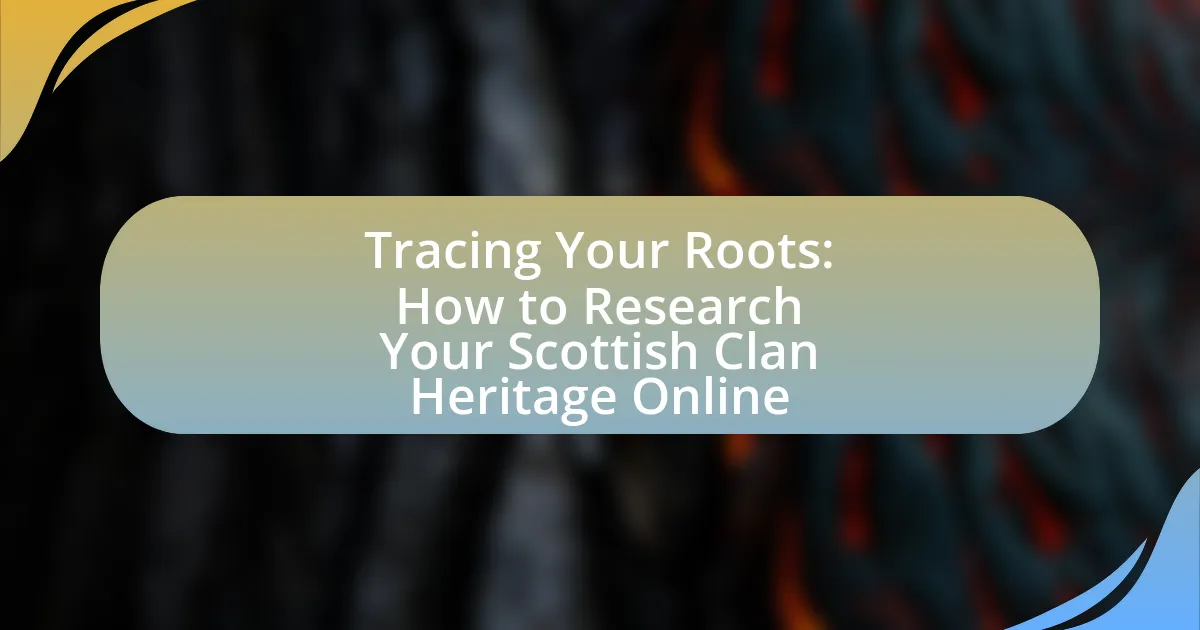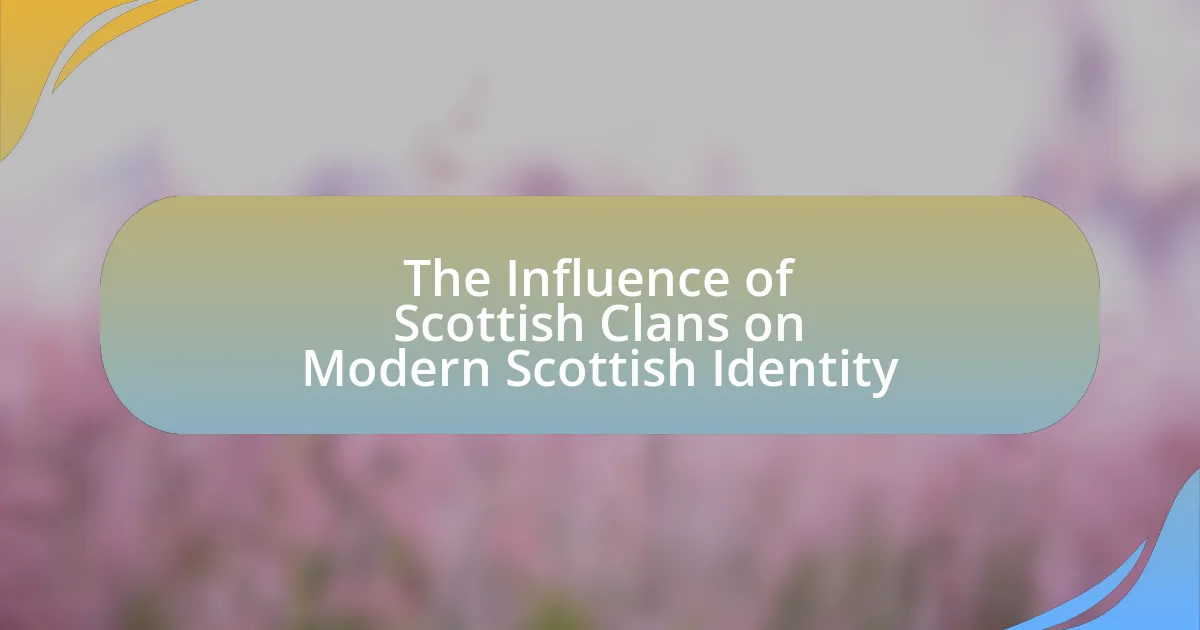The article examines the impact of emigration on Scottish clan lineages, particularly focusing on how historical events such as the Highland Clearances and the Great Famine prompted significant migration to countries like the United States, Canada, and Australia. It discusses the dilution of clan identities due to geographical dispersion and cultural assimilation, while also highlighting the resilience of these identities through community gatherings and cultural preservation efforts in the diaspora. Additionally, the article explores the economic and social factors influencing emigration decisions, the role of technology in maintaining clan connections, and the personal narratives that illustrate the broader experiences of Scottish clans abroad. Finally, it outlines resources and best practices for individuals interested in tracing their Scottish clan ancestry.
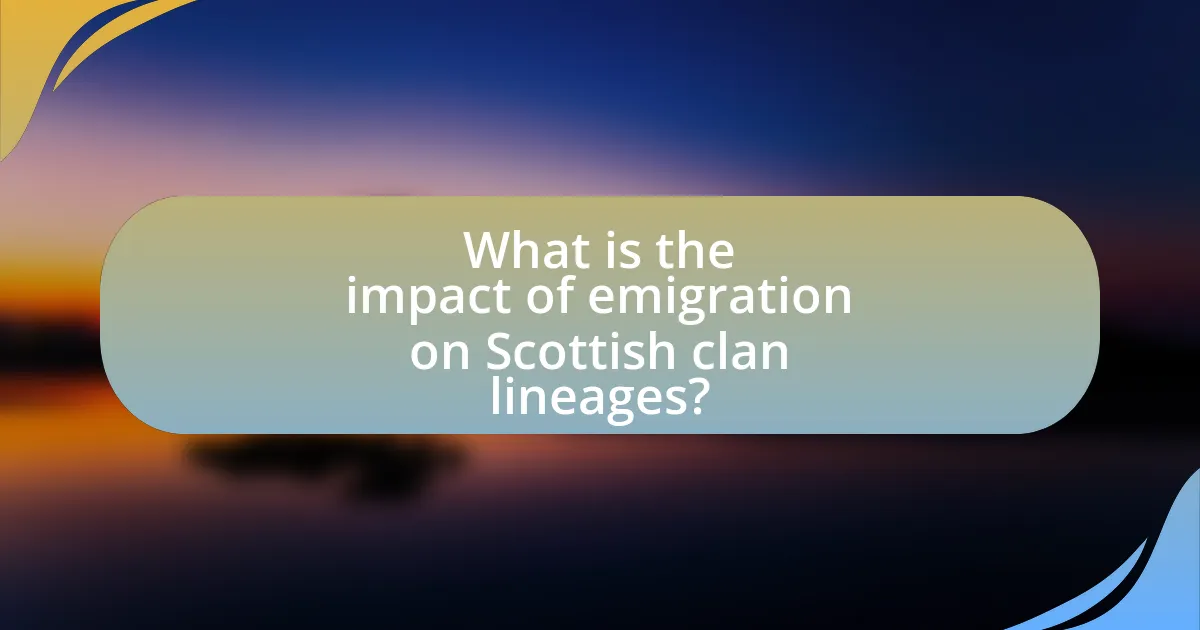
What is the impact of emigration on Scottish clan lineages?
Emigration has significantly diluted the continuity of Scottish clan lineages by dispersing clan members across the globe, leading to a loss of direct connections to ancestral lands and traditions. Historical records indicate that mass emigration, particularly during the Highland Clearances in the 18th and 19th centuries, resulted in many clans losing their members to countries like the United States, Canada, and Australia. This migration often severed ties to the clan’s original geographic and cultural identity, as descendants became assimilated into new societies, adopting different customs and languages. Consequently, the clan system, which relied on close-knit familial and territorial bonds, faced challenges in maintaining its integrity and heritage, as many clan names became less associated with their historical roots.
How has emigration shaped the identity of Scottish clans?
Emigration has significantly shaped the identity of Scottish clans by fostering a sense of belonging and cultural continuity among dispersed members. As Scots migrated, particularly during the 18th and 19th centuries, they maintained their clan affiliations, which became vital for preserving their heritage in foreign lands. For instance, the Highland Clearances led to mass emigration, resulting in Scottish communities forming in places like North America and Australia, where they celebrated their clan traditions through gatherings and festivals. This diaspora not only reinforced clan identities but also adapted them, blending Scottish customs with local influences, thus creating a unique transnational identity that honors both their origins and their new environments.
What historical events prompted significant emigration from Scotland?
Significant emigration from Scotland was prompted by events such as the Highland Clearances, the Great Famine, and economic hardships during the Industrial Revolution. The Highland Clearances, occurring primarily in the late 18th and early 19th centuries, involved the forced eviction of tenants from their lands to make way for sheep farming, leading to mass displacement and emigration. The Great Famine in the 1840s exacerbated food shortages and poverty, driving many Scots to seek better opportunities abroad. Additionally, the Industrial Revolution created economic upheaval, resulting in job losses in traditional sectors and prompting migration to countries like the United States, Canada, and Australia for work and a better quality of life. These events collectively contributed to a significant decline in Scotland’s population as many sought refuge and opportunity overseas.
How do clan identities evolve in the diaspora?
Clan identities evolve in the diaspora through a combination of adaptation to new cultural contexts, preservation of traditional practices, and the formation of new social networks. As Scottish clans migrate, they often modify their identities to align with the values and norms of their host societies while maintaining core elements of their heritage, such as language, customs, and kinship ties. For instance, the Scottish diaspora in North America has seen clans establish associations that promote cultural events, thereby reinforcing clan identity among members who may be geographically dispersed. This evolution is evidenced by the establishment of Highland Games and clan gatherings, which serve as platforms for cultural expression and community building, thus demonstrating how clan identities can adapt and thrive in a new environment while still honoring their historical roots.
Why do individuals from Scottish clans choose to emigrate?
Individuals from Scottish clans choose to emigrate primarily for economic opportunities and social mobility. Historically, many Scots faced limited job prospects and harsh living conditions, particularly during the Highland Clearances in the 18th and 19th centuries, which prompted mass emigration to countries like the United States, Canada, and Australia. This migration was often driven by the search for better livelihoods, land ownership, and the chance to escape poverty. Additionally, cultural ties and the desire for a better quality of life have continued to motivate descendants of Scottish clans to seek opportunities abroad.
What economic factors influence emigration decisions?
Economic factors that influence emigration decisions include job opportunities, wage differentials, and economic stability in the destination country. Individuals often emigrate in search of better employment prospects, higher salaries, and improved living conditions. For instance, according to the World Bank, countries with higher GDP per capita tend to attract more immigrants due to perceived economic advantages. Additionally, economic crises or high unemployment rates in the home country can drive individuals to seek opportunities abroad, as seen in the case of many Scots during the 19th century, who left for North America in search of better livelihoods amidst economic hardship.
How do social and political conditions in Scotland affect emigration rates?
Social and political conditions in Scotland significantly influence emigration rates by shaping individuals’ perceptions of opportunity and stability. For instance, economic challenges, such as high unemployment rates and limited job prospects, often drive residents to seek better opportunities abroad. According to the Scottish Government, net migration figures indicate that during periods of political uncertainty, such as the independence referendum in 2014, emigration rates increased as individuals sought more stable environments. Additionally, social factors like educational opportunities and quality of life also play a crucial role; when these conditions are perceived as lacking, individuals are more likely to leave Scotland in search of improved circumstances elsewhere.
What are the consequences of emigration for clan heritage?
Emigration significantly impacts clan heritage by leading to the dilution of cultural practices and traditions associated with the clan. As members relocate, they often assimilate into new cultures, which can result in the loss of unique clan identities and customs over generations. For example, Scottish clans that emigrated to countries like the United States and Canada have seen their traditional languages, such as Gaelic, decline in use, with many descendants no longer speaking the language. This cultural shift can weaken the connection to ancestral roots and diminish the transmission of clan history and values. Additionally, the geographical dispersion of clan members can fragment communal ties, making it challenging to maintain clan gatherings and rituals that are vital for preserving heritage.
How does emigration affect the transmission of clan traditions?
Emigration significantly disrupts the transmission of clan traditions by creating geographical and cultural distances that hinder the direct practice and sharing of these traditions. When individuals or families emigrate, they often adapt to new environments, which can lead to the dilution or transformation of traditional practices as they integrate into different cultural contexts. For instance, Scottish clans that have members living abroad may experience a decline in traditional gatherings, language use, and rituals, as seen in the diaspora communities in North America, where many Scottish traditions have been modified or lost over generations due to assimilation pressures. This phenomenon is supported by studies indicating that cultural practices tend to weaken when communities are dispersed, as evidenced by the reduced frequency of clan events and the fading of traditional knowledge among younger generations in emigrant families.
What role does technology play in maintaining clan connections across borders?
Technology plays a crucial role in maintaining clan connections across borders by facilitating communication and information sharing among dispersed members. Digital platforms, such as social media, video conferencing, and clan-specific websites, enable individuals to connect in real-time, regardless of geographical barriers. For instance, the use of platforms like Facebook groups allows clan members to share updates, organize events, and preserve cultural heritage, thereby reinforcing their identity and sense of belonging. Additionally, genealogy websites, such as Ancestry.com, provide tools for tracing lineage and connecting with distant relatives, which is essential for clans with members spread across different countries. These technological advancements have significantly enhanced the ability of clans to sustain their relationships and cultural practices in a globalized world.
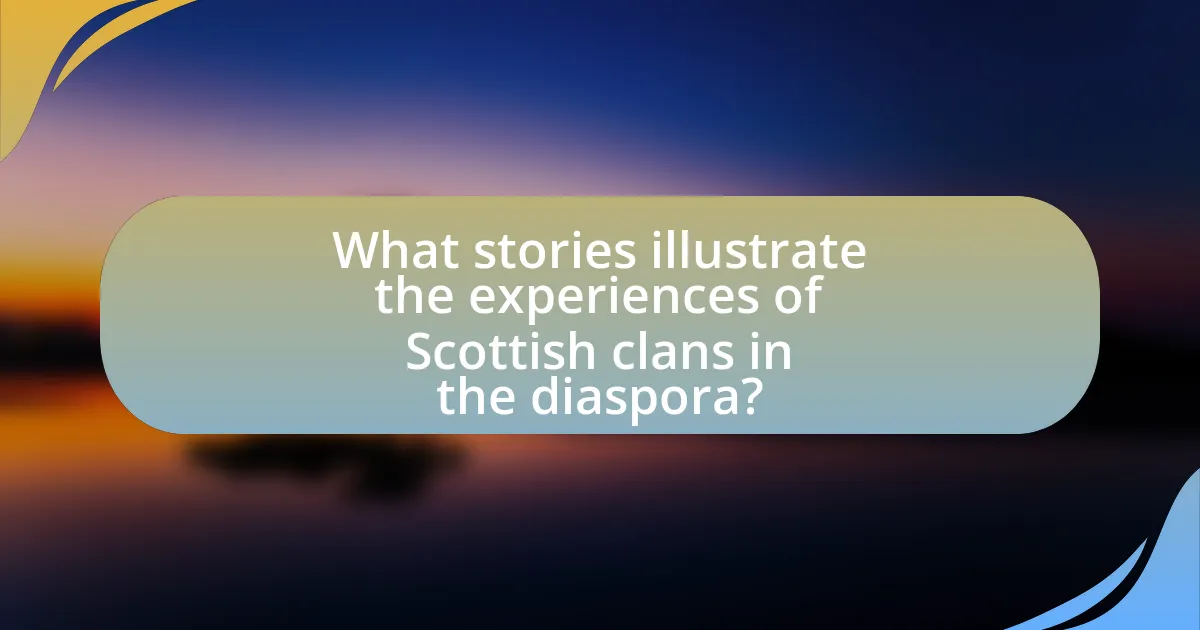
What stories illustrate the experiences of Scottish clans in the diaspora?
Stories illustrating the experiences of Scottish clans in the diaspora include the narratives of the MacLeods in Canada and the Campbells in Australia. The MacLeods, who settled in Cape Breton, Nova Scotia, maintained their cultural heritage through music and Gaelic language, showcasing their resilience and adaptation in a new environment. Similarly, the Campbells, who migrated to Australia during the 19th century, established strong community ties and participated in the gold rush, which significantly influenced their clan identity and economic status. These stories reflect the broader themes of cultural preservation and adaptation faced by Scottish clans as they navigated life in foreign lands.
How do personal narratives reflect the broader impact of emigration?
Personal narratives illustrate the broader impact of emigration by providing individual accounts that highlight cultural, social, and economic changes experienced by emigrants and their descendants. These stories often reveal how emigration reshapes identities, as individuals navigate the complexities of belonging to both their homeland and their new country. For instance, narratives from Scottish emigrants frequently discuss the preservation of clan traditions and the adaptation of cultural practices in diaspora communities, demonstrating the resilience of cultural identity despite geographical displacement. Additionally, personal accounts can reflect the economic motivations behind emigration, such as seeking better opportunities, which in turn influences the socio-economic landscape of both the origin and destination countries. This interplay of personal experience and broader societal trends underscores the multifaceted impact of emigration on clan lineages and cultural heritage.
What are some notable stories of Scottish clan members who emigrated?
Notable stories of Scottish clan members who emigrated include the MacLeods, who settled in North America during the 18th and 19th centuries, significantly influencing the cultural landscape of places like Cape Breton, Nova Scotia. Another example is the Campbell clan, with members who migrated to Australia, where they established successful agricultural enterprises, contributing to the development of the region. The MacGregors also have a notable story, as many fled to the United States in the 18th century, where they became prominent in various fields, including politics and business. These stories illustrate the diverse paths and contributions of Scottish clan members in their new homelands.
How do these stories highlight the challenges faced by emigrants?
These stories highlight the challenges faced by emigrants by illustrating the emotional and logistical difficulties encountered during their journeys. For instance, many emigrants experienced separation from family and cultural roots, leading to feelings of isolation and loss. Additionally, the narratives often depict the struggle to adapt to new environments, including language barriers and economic hardships, which are common obstacles faced by those relocating. Historical accounts reveal that Scottish emigrants frequently encountered discrimination and were forced to navigate unfamiliar social systems, further complicating their integration into new communities.
What role do community organizations play in supporting Scottish emigrants?
Community organizations play a crucial role in supporting Scottish emigrants by providing essential resources, networking opportunities, and cultural connections. These organizations often offer assistance with settling into new environments, including guidance on legal matters, employment resources, and social services tailored to the needs of Scottish expatriates. For instance, organizations like the Scottish Diaspora Tapestry and various Scottish societies abroad facilitate cultural events and gatherings that help maintain a sense of identity and community among emigrants. Additionally, they often serve as platforms for sharing information about heritage and clan lineage, which is vital for those looking to connect with their roots.
How do these organizations help preserve clan heritage abroad?
Organizations dedicated to preserving clan heritage abroad actively engage in cultural education, community events, and genealogical research. They facilitate gatherings such as clan gatherings and festivals, which promote traditional customs and foster connections among members of the diaspora. For instance, the Clan Campbell Society and the Clan MacLeod Society organize events that celebrate Scottish culture, allowing members to share stories and maintain their heritage. Additionally, these organizations often provide resources for genealogical research, helping individuals trace their ancestry and connect with their clan’s history, thereby reinforcing a sense of identity and belonging among expatriates.
What initiatives exist to connect diaspora members with their roots?
Initiatives that connect diaspora members with their roots include cultural heritage programs, genealogy research services, and clan gatherings. Organizations such as the Scottish Diaspora Tapestry project actively engage diaspora communities by encouraging them to share their stories and heritage through art and storytelling. Additionally, genealogy websites like Ancestry.com and MyHeritage provide tools for individuals to trace their lineage, often leading them back to their ancestral clans. Clan societies, such as the Clan Campbell Society, organize events and reunions that foster connections among members and promote a sense of belonging to their heritage. These initiatives are supported by historical records and community engagement, reinforcing the ties between diaspora members and their Scottish roots.

How can understanding the impact of emigration enhance our appreciation of Scottish clan lineages?
Understanding the impact of emigration enhances our appreciation of Scottish clan lineages by revealing how migration shaped the identities and histories of these clans. Emigration led to the dispersion of clan members, resulting in the establishment of Scottish communities worldwide, particularly in countries like the United States, Canada, and Australia. This global presence has allowed for the preservation and evolution of clan traditions, as descendants maintain connections to their heritage through cultural practices, gatherings, and genealogical research. For instance, the Clan MacGregor has a significant diaspora in Australia, where annual gatherings celebrate their shared lineage, reinforcing the clan’s identity despite geographical separation. Such insights into the effects of emigration highlight the resilience and adaptability of Scottish clans, deepening our understanding of their historical narratives and cultural significance.
What lessons can be learned from the experiences of Scottish clans in the diaspora?
The experiences of Scottish clans in the diaspora teach the importance of cultural preservation and adaptation. Clans maintained their identities through traditions, language, and community ties, even in foreign lands, demonstrating resilience. For instance, the Scottish diaspora in North America established organizations like the St. Andrew’s Society to promote Scottish culture and support fellow Scots, highlighting the significance of community in preserving heritage. Additionally, the adaptability of clans to new environments, while retaining core values, illustrates how cultural identity can evolve without losing its essence. This adaptability is evident in the integration of Scottish customs into local practices, enriching both the diaspora and host cultures.
How can these lessons inform current discussions on migration and identity?
Lessons from the impact of Scottish emigration on clan lineages can inform current discussions on migration and identity by highlighting the complexities of cultural preservation and adaptation. Historical patterns show that Scottish emigrants maintained their identities through clan affiliations while also integrating into new societies, illustrating the duality of belonging. For instance, the Scottish diaspora in North America has preserved traditions such as Highland games and clan gatherings, which serve as a means of cultural continuity. This demonstrates that migration does not erase identity but can transform it, allowing for a hybrid identity that reflects both heritage and new influences. Such insights can guide contemporary debates on how migrants navigate their identities in increasingly multicultural societies, emphasizing the importance of recognizing both the challenges and enrichments that migration brings to cultural identity.
What best practices can clans adopt to preserve their heritage in a global context?
Clans can adopt several best practices to preserve their heritage in a global context, including establishing cultural exchange programs, digitizing historical records, and fostering community engagement through events. Cultural exchange programs allow clans to connect with members worldwide, sharing traditions and practices that reinforce their identity. Digitizing historical records, such as clan histories and genealogies, ensures that valuable information is accessible to future generations, regardless of geographical barriers. Additionally, organizing events like clan gatherings or festivals encourages participation and strengthens bonds among members, promoting a sense of belonging and continuity. These practices are supported by studies showing that active engagement and accessibility to heritage resources significantly enhance cultural preservation efforts.
What resources are available for those interested in exploring their Scottish clan lineage?
Resources available for exploring Scottish clan lineage include the Scottish Clan and Family History Society, which provides access to genealogical records and clan-specific resources. Additionally, the National Records of Scotland offers a wealth of historical documents, including birth, marriage, and death records that can aid in tracing lineage. Online platforms such as Ancestry.com and Findmypast also feature extensive databases of Scottish records, including census data and military records, which are crucial for genealogical research. Furthermore, local Scottish heritage centers and libraries often hold unique collections and can provide personalized assistance in clan research.
How can individuals trace their clan ancestry effectively?
Individuals can trace their clan ancestry effectively by utilizing a combination of genealogical research, DNA testing, and historical records. Genealogical research involves gathering information from family trees, oral histories, and public records such as birth, marriage, and death certificates. DNA testing can provide insights into genetic connections and help identify relatives, particularly useful for those with limited documentation. Historical records, including clan histories and migration patterns, offer context and can reveal connections to specific clans. For example, the Scottish Government’s “Scotland’s People” website provides access to a wealth of historical documents that can aid in tracing lineage.
What tools and organizations can assist in this exploration?
Genealogical research tools and organizations that can assist in exploring the impact of emigration on Scottish clan lineages include Ancestry.com, FamilySearch, and the Scottish Genealogy Society. Ancestry.com provides access to a vast database of historical records, including immigration and census data, which can help trace clan lineage. FamilySearch offers free resources and a collaborative platform for genealogical research, including records specific to Scottish ancestry. The Scottish Genealogy Society specializes in Scottish family history and provides resources, publications, and expert guidance on tracing clan lineages. These organizations and tools are essential for individuals seeking to understand their heritage and the effects of emigration on their family histories.
